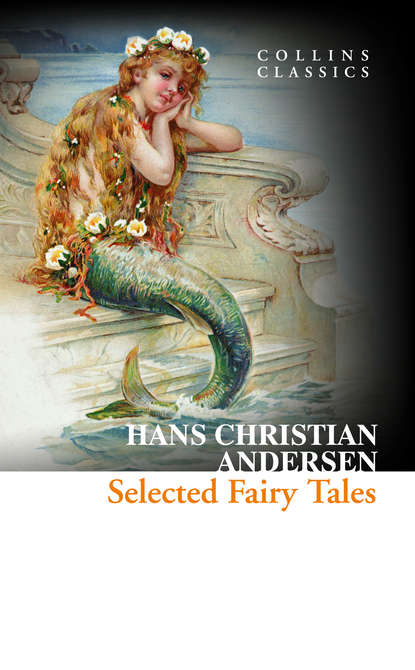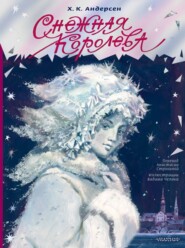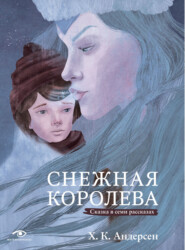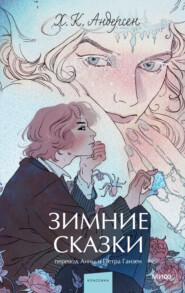По всем вопросам обращайтесь на: info@litportal.ru
(©) 2003-2024.
✖
Selected Fairy Tales
Автор
Год написания книги
2019
Настройки чтения
Размер шрифта
Высота строк
Поля
It was a bitterly cold morning; clouds of mist were rising from beneath, and Rudy stood on the lower step of the ladder as a fly rests on a piece of swinging straw, which a bird may have dropped from the edge of the nest it was building on some tall factory chimney; but the fly could fly away if the straw were shaken, Rudy could only break his neck. The wind whistled around him, and beneath him the waters of the abyss, swelled by the thawing of the glaciers, those palaces of the Ice Maiden, foamed and roared in their rapid course. When Rudy began to ascend, the ladder trembled like the web of the spider, when it draws out the long, delicate threads; but as soon as he reached the fourth of the ladders, which had been bound together, he felt more confidence,—he knew that they had been fastened securely by skilful hands. The fifth ladder, that appeared to reach the nest, was supported by the sides of the rock, yet it swung to and fro, and flapped about like a slender reed, and as if it had been bound by fishing lines. It seemed a most dangerous undertaking to ascend it, but Rudy knew how to climb; he had learnt that from the cat, and he had no fear. He did not observe Vertigo, who stood in the air behind him, trying to lay hold of him with his outstretched polypous arms.
When at length he stood on the topmost step of the ladder, he found that he was still some distance below the nest, and not even able to see into it. Only by using his hands and climbing could he possibly reach it. He tried the strength of the stunted trees, and the thick underwood upon which the nest rested, and of which it was formed, and finding they would support his weight, he grasped them firmly, and swung himself up from the ladder till his head and breast were above the nest, and then what an overpowering stench came from it, for in it lay the putrid remains of lambs, chamois, and birds. Vertigo, although he could not reach him, blew the poisonous vapour in his face, to make him giddy and faint; and beneath, in the dark, yawning deep, on the rushing waters, sat the Ice Maiden, with her long, pale, green hair falling around her, and her death-like eyes fixed upon him, like the two barrels of a gun. “I have thee now,” she cried.
In a corner of the eagle’s nest sat the young eaglet, a large and powerful bird, though still unable to fly. Rudy fixed his eyes upon it, held on by one hand with all his strength, and with the other threw a noose round the young eagle. The string slipped to its legs. Rudy tightened it, and thus secured the bird alive. Then flinging the sling over his shoulder, so that the creature hung a good way down behind him, he prepared to descend with the help of a rope, and his foot soon touched safely the highest step of the ladder. Then Rudy, remembering his early lesson in climbing, “Hold fast, and do not fear,” descended carefully down the ladders, and at last stood safely on the ground with the young living eaglet, where he was received with loud shouts of joy and congratulations.
VIII. What Fresh News the Parlour-Cat Had to Tell
“There is what you asked for,” said Rudy, as he entered the miller’s house at Bex, and placed on the floor a large basket. He removed the lid as he spoke, and a pair of yellow eyes, encircled by a black ring, stared forth with a wild, fiery glance, that seemed ready to burn and destroy all that came in its way. Its short, strong beak was open, ready to bite, and on its red throat were short feathers, like stubble.
“The young eaglet!” cried the miller.
Babette screamed, and started back, while her eyes wandered from Rudy to the bird in astonishment.
“You are not to be discouraged by difficulties, I see,” said the miller.
“And you will keep your word,” replied Rudy. “Each has his own characteristic, whether it is honour or courage.”
“But how is it you did not break your neck?” asked the miller.
“Because I held fast,” answered Rudy; “and I mean to hold fast to Babette.”
“You must get her first,” said the miller, laughing; and Babette thought this a very good sign.
“We must take the bird out of the basket,” said she. “It is getting into a rage; how its eyes glare. How did you manage to conquer it?”
Then Rudy had to describe his adventure, and the miller’s eyes opened wide as he listened.
“With your courage and your good fortune you might win three wives,” said the miller.
“Oh, thank you,” cried Rudy.
“But you have not won Babette yet,” said the miller, slapping the young Alpine hunter on the shoulder playfully.
“Have you heard the fresh news at the mill?” asked the parlour-cat of the kitchen-cat. “Rudy has brought us the young eagle, and he is to take Babette in exchange. They kissed each other in the presence of the old man, which is as good as an engagement. He was quite civil about it; drew in his claws, and took his afternoon nap, so that the two were left to sit and wag their tails as much as they pleased. They have so much to talk about that it will not be finished till Christmas.” Neither was it finished till Christmas.
The wind whirled the faded, fallen leaves; the snow drifted in the valleys, as well as upon the mountains, and the Ice Maiden sat in the stately palace which, in winter time, she generally occupied. The perpendicular rocks were covered with slippery ice, and where in summer the stream from the rocks had left a watery veil, icicles large and heavy hung from the trees, while the snow-powdered fir-trees were decorated with fantastic garlands of crystal. The Ice Maiden rode on the howling wind across the deep valleys, the country, as far as Bex, was covered with a carpet of snow, so that the Ice Maiden could follow Rudy, and see him, when he visited the mill; and while in the room at the miller’s house, where he was accustomed to spend so much of his time with Babette. The wedding was to take place in the following summer, and they heard enough of it, for so many of their friends spoke of the matter.
Then came sunshine to the mill. The beautiful Alpine roses bloomed, and joyous, laughing Babette, was like the early spring, which makes all the birds sing of summer time and bridal days.
“How those two do sit and chatter together,” said the parlour-cat; “I have had enough of their mewing.”
IX. The Ice Maiden
The walnut and chestnut trees, which extend from the bridge of St. Maurice, by the river Rhone, to the shores of the lake of Geneva, were already covered with the delicate green garlands of early spring, just bursting into bloom, while the Rhone rushed wildly from its source among the green glaciers which form the ice palace of the Ice Maiden. She sometimes allows herself to be carried by the keen wind to the lofty snow-fields, where she stretches herself in the sunshine on the soft snowy-cushions. From thence she throws her far-seeing glance into the deep valley beneath, where human beings are busily moving about like ants on a stone in the sun. “Spirits of strength, as the children of the sun call you,” cried the Ice Maiden, “ye are but worms! Let but a snow-ball roll, and you and your houses and your towns are crushed and swept away.” And she raised her proud head, and looked around her with eyes that flashed death from their glance. From the valley came a rumbling sound; men were busily at work blasting the rocks to form tunnels, and laying down roads for the railway. “They are playing at work underground, like moles,” said she. “They are digging passages beneath the earth, and the noise is like the reports of cannons. I shall throw down my palaces, for the clamour is louder than the roar of thunder.” Then there ascended from the valley a thick vapour, which waved itself in the air like a fluttering veil. It rose, as a plume of feathers, from a steam engine, to which, on the lately-opened railway, a string of carriages was linked, carriage to carriage, looking like a winding serpent. The train shot past with the speed of an arrow. “They play at being masters down there, those spirits of strength!” exclaimed the Ice Maiden; “but the powers of nature are still the rulers.” And she laughed and sang till her voice sounded through the valley, and people said it was the rolling of an avalanche. But the children of the sun sang in louder strains in praise of the mind of man, which can span the sea as with a yoke, can level mountains, and fill up valleys. It is the power of thought which gives man the mastery over nature.
Just at this moment there came across the snow-field, where the Ice Maiden sat, a party of travellers. They had bound themselves fast to each other, so that they looked like one large body on the slippery plains of ice encircling the deep abyss.
“Worms!” exclaimed the Ice Maiden. “You, the lords of the powers of nature!” And she turned away and looked maliciously at the deep valley where the railway train was rushing by. “There they sit, these thoughts!” she exclaimed. “There they sit in their power over nature’s strength. I see them all. One sits proudly apart, like a king; others sit together in a group; yonder, half of them are asleep; and when the steam dragon stops, they will get out and go their way. The thoughts go forth into the world,” and she laughed.
“There goes another avalanche,” said those in the valley beneath.
“It will not reach us,” said two who sat together behind the steam dragon. “Two hearts and one beat,” as people say. They were Rudy and Babette, and the miller was with them. “I am like the luggage,” said he; “I am here as a necessary appendage.”
“There sit those two,” said the Ice Maiden. “Many a chamois have I crushed. Millions of Alpine roses have I snapped and broken off; not a root have I spared. I know them all, and their thoughts, those spirits of strength!” and again she laughed.
“There rolls another avalanche,” said those in the valley.
X. The Godmother
At Montreux, one of the towns which encircle the northeast part of the lake of Geneva, lived Babette’s godmother, the noble English lady, with her daughters and a young relative. They had only lately arrived, yet the miller had paid them a visit, and informed them of Babette’s engagement to Rudy. The whole story of their meeting at Interlachen, and his brave adventure with the eaglet, were related to them, and they were all very much interested, and as pleased about Rudy and Babette as the miller himself. The three were invited to come to Montreux; it was but right for Babette to become acquainted with her godmother, who wished to see her very much. A steam-boat started from the town of Villeneuve, at one end of the lake of Geneva, and arrived at Bernex, a little town beyond Montreux, in about half an hour. And in this boat, the miller, with his daughter and Rudy, set out to visit her godmother. They passed the coast which has been so celebrated in song. Here, under the walnut-trees, by the deep blue lake, sat Byron, and wrote his melodious verses about the prisoner confined in the gloomy castle of Chillon. Here, where Clarens, with its weeping-willows, is reflected in the clear water, wandered Rousseau, dreaming of Heloise. The river Rhone glides gently by beneath the lofty snow-capped hills of Savoy, and not far from its mouth lies a little island in the lake, so small that, seen from the shore, it looks like a ship. The surface of the island is rocky; and about a hundred years ago, a lady caused the ground to be covered with earth, in which three acacia-trees were planted, and the whole enclosed with stone walls. The acacia-trees now overshadow every part of the island. Babette was enchanted with the spot; it seemed to her the most beautiful object in the whole voyage, and she thought how much she should like to land there. But the steam-ship passed it by, and did not stop till it reached Bernex. The little party walked slowly from this place to Montreux, passing the sun-lit walls with which the vineyards of the little mountain town of Montreux are surrounded, and peasants’ houses, overshadowed by fig-trees, with gardens in which grow the laurel and the cypress.
Halfway up the hill stood the boarding-house in which Babette’s godmother resided. She was received most cordially; her godmother was a very friendly woman, with a round, smiling countenance. When a child, her head must have resembled one of Raphael’s cherubs; it was still an angelic face, with its white locks of silvery hair. The daughters were tall, elegant, slender maidens.
The young cousin, whom they had brought with them, was dressed in white from head to foot; he had golden hair and golden whiskers, large enough to be divided amongst three gentlemen; and he began immediately to pay the greatest attention to Babette.
Richly bound books, note-paper, and drawings, lay on the large table. The balcony window stood open, and from it could be seen the beautiful wide extended lake, the water so clear and still, that the mountains of Savoy, with their villages, woods, and snow-crowned peaks, were clearly reflected in it.
Rudy, who was usually so lively and brave, did not in the least feel himself at home; he acted as if he were walking on peas, over a slippery floor. How long and wearisome the time appeared; it was like being in a treadmill. And then they went out for a walk, which was very slow and tedious. Two steps forwards and one backwards had Rudy to take to keep pace with the others. They walked down to Chillon, and went over the old castle on the rocky island. They saw the implements of torture, the deadly dungeons, the rusty fetters in the rocky walls, the stone benches for those condemned to death, the trap-doors through which the unhappy creatures were hurled upon iron spikes, and impaled alive. They called looking at all these a pleasure. It certainly was the right place to visit. Byron’s poetry had made it celebrated in the world. Rudy could only feel that it was a place of execution. He leaned against the stone framework of the window, and gazed down into the deep, blue water, and over to the little island with the three acacias, and wished himself there, away and free from the whole chattering party. But Babette was most unusually lively and good-tempered.
Вы ознакомились с фрагментом книги.
Приобретайте полный текст книги у нашего партнера:
Приобретайте полный текст книги у нашего партнера:

















